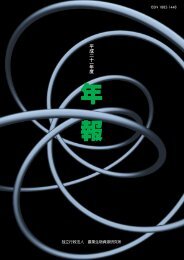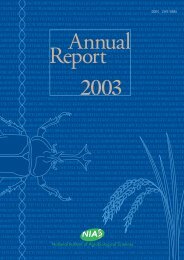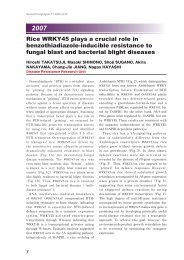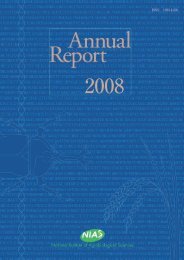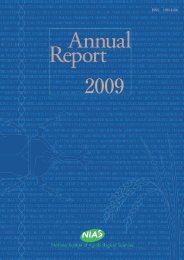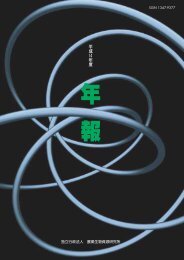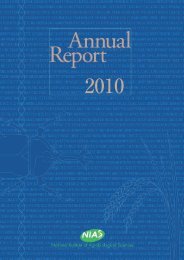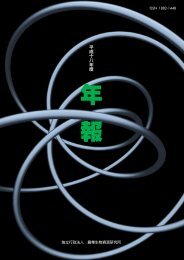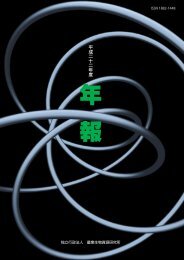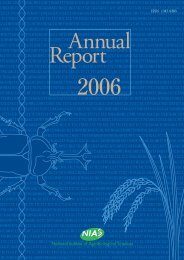No.42 - è¾²æ¥çç©è³æºç 究æ
No.42 - è¾²æ¥çç©è³æºç 究æ
No.42 - è¾²æ¥çç©è³æºç 究æ
You also want an ePaper? Increase the reach of your titles
YUMPU automatically turns print PDFs into web optimized ePapers that Google loves.
Gamma Field Symposia, No. 42, 2003 Institute of Radiation Breeding<br />
NIAS, Japan<br />
PEPTIDE PLANT HORMONE, PHYTOSULFOKINE<br />
67<br />
PEPTIDE PLANT HORMONE, PHYTOSULFOKINE<br />
Yoshikatsu MATSUBAYASHI<br />
Graduate School of Bio-Agricultural Sciences, Nagoya University<br />
Chikusa, Nagoya, 464-8601, Japan<br />
e-mail: matsu@agr.nagoya-u.ac.jp<br />
Key words: phytosulfokine, peptide hormone, receptor kinase, dedifferentiation, proliferation<br />
Abstract<br />
Plant cells retain features characteristic of totipotent stem cells. That is, they have the<br />
potential to dedifferentiate, re-differentiate, and give rise to all the organs of a new plant. However,<br />
relative rates of these cellular processes are strictly dependent on initial cell density, suggesting<br />
that cell-to-cell communication is necessary for these processes. Recent biochemical purification<br />
studies have demonstrated that phytosulfokine (PSK), a small sulfated peptide, acts as an<br />
extracellular ligand involved in the initial step of cellular dedifferentiation, proliferation and redifferentiation.<br />
Furthermore, a 120-kD leucine-rich repeat receptor kinase, specifically interacting<br />
with PSK, has been purified from plasma membranes using ligand-based affinity chromatography.<br />
Lines of evidence suggest that this ligand-receptor pair confers competence for dedifferentiation<br />
and re-differentiation to individual cells, rather than directly determining cellular fate. In this<br />
article, I review what is known about PSK signaling.<br />
Introduction<br />
A high proportion of plant cells, even at a fully differentiated stage, can dedifferentiate and<br />
proliferate in vitro as totipotent stem cells, forming a structure called a callus, after treatment with<br />
plant hormones such as auxin and cytokinin. (Skoog F & Miller CO 1967) Callus cells can<br />
differentiate into various organs and give rise to a new plant, indicating that plant cells from<br />
specific adult tissues are capable of differentiating into cells of all tissues. However, relative rates<br />
of cellular dedifferentiation and growth in vitro generally depend on initial cell density. Cellular<br />
dedifferentiation and growth progress efficiently under high cell density, but are significantly<br />
suppressed under low cell density. To promote cellular growth at low cell density, several<br />
researchers have used specialized culture techniques such as nurse cultures, in which target cells



